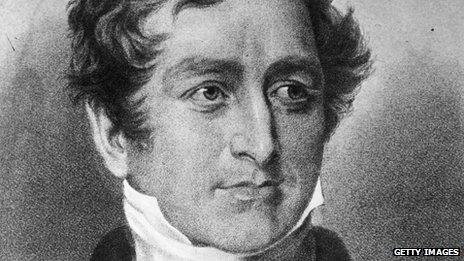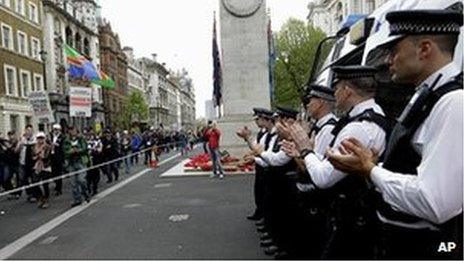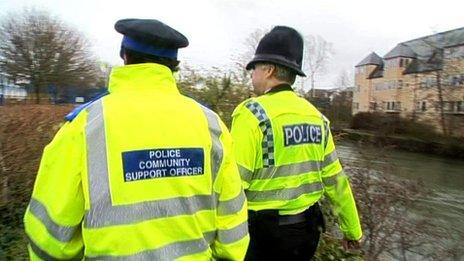Going back to first principles
- Published
- comments
Her Majesty's Inspectorate of Constabulary is an organisation with a dust-laden, antiquated sounding name. Small wonder, perhaps, that 21st Century marketing people have reduced it to HMIC on the letterhead and doorplate, fearful of appearing outdated and out-of-touch.
The word 'constabulary' takes us back to the earliest days of the police service - of 19th Century crime-ridden London and the constables who marched out of their stations for the first time in 1829, a copy of Sir Robert Peel's Principles of Law Enforcement in their breast pocket.
Hold on, though. Thumb through today's assessment of policing in England and Wales from the HMIC and there is the document republished in full.
At a time when public trust has been "severely shaken", HM Chief Inspector of Constabulary Tom Winsor encourages the police service to go back to those first principles.

Sir Robert Peel is known as the father of modern policing
"The test of police efficiency is the absence of crime and disorder, not the visible evidence of police action in dealing with them", Sir Robert explained in 1829.
"Prevention is far better than cure in policing," says Mr Winsor in 2014.
"Who could argue that a rape detected is preferable to the same rape prevented, a murder solved is better than a life saved, or the arrest of a paedophile is better than the children in question never coming to harm in the first place?" the report asks. No-one, of course.
The public debate about protecting front-line policing in the face of budget reductions, however, tends to focus on blues-and-twos crime response, the dramatic and the forensic. No-one has ever made a prime-time TV series about the heroes of the police crime prevention team.
Officers going into primary schools to chat to children about community safety, or encouraging cyclists to security mark their bikes, won't make the headlines, leaving crime prevention more vulnerable to cut-backs.
Spending time working with a family to prevent possible domestic violence or child abuse does not fit with our image of the busy police officer.
Some will question whether such crime prevention is the responsibility of the police at all. Shouldn't social services be doing that kind of stuff?
As Peel's principles put it, police are "paid to give full-time attention to duties which are incumbent on every citizen". When it comes to crime prevention, Peel and Winsor agree, we are all in it together.

A demonstration against police cuts in 2012
Indeed, the HMIC report lists some of the other state agencies and 'emanations of communities' that need to step up to assist in preventing crime: parents and families; schools; health professionals, particularly in the field of mental health; other parts of the criminal justice system.
Mr Winsor also lists some of the potential causes of crime that might be a useful starting point in constructing crime prevention plans - although he accepts there is no definitive list.
"The disintegration of deference and respect for authority" should be on the list, he suggests, as well as "envy, greed, materialism and the corrosive effects of readily-available hard-core pornography and the suppression of instincts of revulsion to violence through the conditioning effect of exposure to distasteful and extreme computer games and films."
"And some people are just selfish, greedy or wicked," Mr Winsor adds.
The words could have had their origins in a sermon from a Victorian pulpit - the stress on individual responsibility and social propriety, on the need to confront greed and wickedness.
Quite how a neighbourhood policing team might be expected to counteract "the disintegration of deference" or the "suppression of instincts of revulsion to violence" is not immediately obvious. But the report says it is "extremely important that the first obligation of the police, in preventing crime, is given the attention and resources required."

The report stressed the importance of crime prevention
Here, then, is Tom Winsor's real challenge. With police budgets squeezed and Police and Crime Commissioners anxious to demonstrate they are protecting the front line, his report stresses they "should never dismiss or disregard the imperative of keeping everyone safe, especially the silent, the fearful and the weak". The people who don't vote, he could have added.
It is an exhortation that comes straight from Sir Robert Peel's Principles of Law Enforcement and its demand for "absolutely impartial service to the law".
Principle Number One begins thus: "The basic mission for which police exist is to prevent crime and disorder."